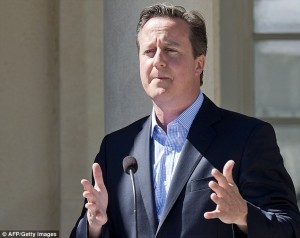David Cameron on Muscular Britishness

In the wake of Operation Trojan Horse, the plot to Islamicise Britain by co-oping schools and then running them according to Islamist ideas an beliefs, British Prime Minister, David Cameron, has now written an article for The Daily Mail, expressing his commitment to promoting “muscular” Britishness in schools.
Muscular Britishness? This sounds very similar to Cameron’s call for “muscular liberalism”, made in 2010, when he concluded, decades too late, that “multiculturalism has failed”.
With such an antecedent, readers could certainly justify a measure of scepticism. And, indeed, when one analyses Cameron’s piece, there is much to comment on.
His central thesis is that “we”—an inclusive euphemism for “the British political establishment”—have been far too tolerant, effectively saying that if you don’t like democracy, or can’t get excited about equality, or would rather not be tolerant, it’s all good, nothing to worry about, we’re happy to live and let live. And this, he says, has got to stop. Particularly since it has led to division, extremism, and violence. Instead, the British government should use the system of education to promote British values and pride in Britishness, so that the “diverse nation” can be unified.
Notice how Cameron defines Britishness: democracy, equality, and tolerance.
Notice also the strange contradiction, right from the outset, between tolerance being a British value and his call to be intolerant of non-British values in order to promote Britishness.
So he’s effectively asking Britons to be unBritish in order to be more British.
Nor only that, but he is also asking for that to be done with pride. But then, if equality is British, how can a Briton feel pride? Does not pride derive from a sense of superiority? And would that not be incompatible with equality—no better and no worse than anybody else?
I suppose the response to that is that it is British to value equality before the law and to see everyone as being equal in human dignity and rights, and that that in itself is what makes the British superior. That would, however, mean that those who do not subscribe to these ideas are not only not British, but also necessarily inferior, leaving us again with a contradiction. . . .



